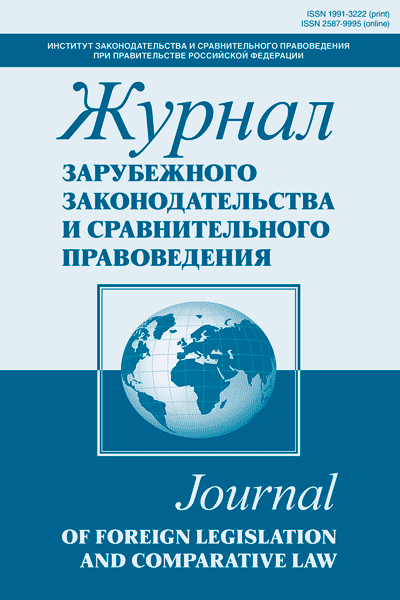The article deals with national approaches to the identification of the author: on the basis of “lex origins” in the framework of intellectual Statute (Portugal, Romania) or contrary to the Intellectual statute (Russia, USA), on the basis of “lex loci protectionis” (Austria, Germany, Belgium). The conclusion is drawn in respect of the use of collision formula «lex origins» to determine the author of the work as the most appropriate mechanism which leads to the solution of the problem of the initial authorship according to a single law, no matter which country’s court considered the dispute. The attention is paid to inaccuracies in the wording of the scope and to the connecting factor of the domestic conflict norm which selects the applicable law to govern the identification of authorship. In order to improve the domestic conflict regulation it is advisable to formulate in the Civil Code the general rule of conflict of laws that is applicable to identify the author / initial owner of the creation removing the indication that restricts the volume of rules in the Article 1256 p. 3 of the Russian Civil Code, adding to this norm the subsidiary connecting factor “lex loci protectionis” and retaining the general connecting factor “lex origins”. It is also proposed to include into the Russian Civil Code’s Article 1256 a special conflict of laws rule for determining the applicable law to identify the author / initial owner which would correlate with the principle of freedom of contract and would be based on the general connecting factor — “law of party autonomy” (lex voluntatis), and subsidiary connecting factor – “contract law of the country” (lex contractus) for the work for hire which has been created under the contract.
the international copyright, the cross-border relations, the conflict regulation, lex origins, lex loci protectionis, the identification of the author, the initial owner, the applicable law.
1. Conflict of Laws in Intellectual Property: The CLIP Principles and Commentary. European Max Planck Group on Conflict of Laws in Intellectual Property. Oxford, 2015.
2. Ginsburg J. The Private International Law of Copyright in an Era of Technological Change. Hague Academy of International Law. 1998.
3. Plenter S. Choice of Law Rules for Copyright Infringements in the Global Information Infrastructure: A Never-ending Story?. European Intellectual Property Review. 2000.
4. Sotiris P. Comparative Issues on Copyright Protection for Films in the US and Greece. Journal of Intellectual Property Rights. 2014. July. Vol. 19. I.4.
5. Bentli L., Sherman B. Pravo intellektual´noy sobstvennosti: avtorskoe pravo / per. s angl. V. L. Vol´fsona. SPb., 2004.
6. Gavrilov E. P. Reshenie voprosov mezhdunarodnogo chastnogo prava v chasti chetvertoy GK RF. Khozyaystvo i pravo. 2008. № 3.
7. Dozortsev V. A. Intellektual´nye prava. Ponyatie. Sistema. Zadachi kodifikatsii: sb. statey. M., 2005.
8. Krupko S. I. Kollizionno-pravovye aspekty regulirovaniya intellektual´noy sobstvennosti. Khozyaystvo i pravo. 2014. № 11.
9. Krupko S. I. Kollizionno-pravovye problemy ustanovleniya avtora / pervonachal´nogo pravoobladatelya isklyuchitel´nykh prav na ob´´ekty avtorskogo prava v aspekte rossiyskogo prava. Dostup iz SPS «Konsul´tantPlyus».
10. Krupko S. I. Ustanovlenie pervichnogo obladatelya isklyuchitel´nykh prav na rezul´taty intellektual´noy deyatel´nosti v svete chasti IV Grazhdanskogo kodeksa RF. Gosudarstvo i pravo. 2012. № 9.
11. Makovskiy A. L. Amerikanskaya istoriya. Vestnik grazhdanskogo prava. 2007. № 1.
12. Serebrovskiy V. I. Voprosy sovetskogo avtorskogo prava. M., 1956.
13. Khokhlov V. A. O prave avtorstva. Zakony Rossii: opyt, analiz, praktika. 2012. № 4.
14. Shak X. Novye tekhnologii i intellektual´naya sobstvennost´. Byulleten´ po avtorskomu pravu. 2000. № 3.





